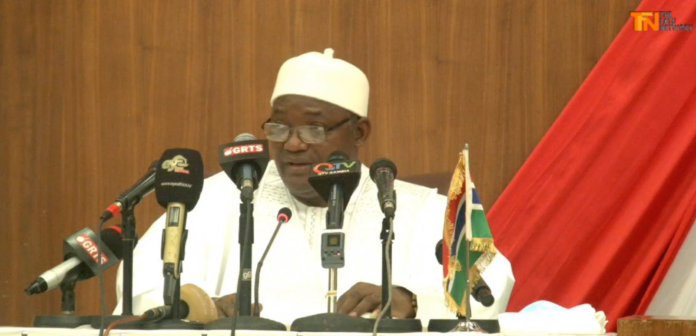By Sarjo Brito and Lamin Njie, at the National Assembly
President Adama Barrow stated on Thursday The Gambia was on a ‘steep’ rise towards economic boom when the ‘unexpected’ struck – the coronavirus pandemic – and caused a major hold-back.
President Barrow on Thursday spent one hour and twenty minutes addressing members of the national assembly on his government’s plans as required by law. It was the fourth time the president was involved in a State of the Nation Address since he took power nearly four years ago.
The coronavirus pandemic meant this year’s State of the Nation Address took a subdued outlook, with members of the public, the business and diplomatic community all missing.
House speaker Mariam Jack Denton insisted that this year’s State of the Nation Address is being conducted in a ‘very unusual manner since we’re living in extraordinary times’.
“I have acted in good faith and conscience to invoke Section 98(2) of the 1997 constitution and Clause 11(4) of the Standing Orders of the National Assembly to restrict the admission of strangers into the public gallery, in line with the general principles of public gathering regulations amid Covid-19,” she said.
The president while addressing MPs said his government was on course towards delivering democratic dividends when the coronavirus pandemic struck and caused a disruption.
Mr Barrow said in the early stages of his speech: “Today, my address presents the successes and challenges of a country that was on a steep rise towards economic boom and socio-political transformation when the unexpected struck. This was the sudden outbreak and rapid spread of the coronavirus, COVID-19 pandemic.”
“This is a crisis that has taken the world by storm, and remains a threat to all nations – rich and poor, big and small.
“In The Gambia, the momentum and expectations for rapid progress were evidently very high. Major development projects and achievements closely followed one another, as support and resources were sought and tapped from various sources.
“The people were politically excited, and my government was optimistic of delivering on our promise of leading the nation to unprecedented economic growth and social regeneration in a democratic haven for all Gambians.
“Unfortunately, like other nations, we had to curtail certain economic activities, restrict movement, scale down work schedules and, finally, declare a state of emergency. Economically, key revenue-earning institutions have since been crippled, people grounded and communities adversely affected,” he said.




